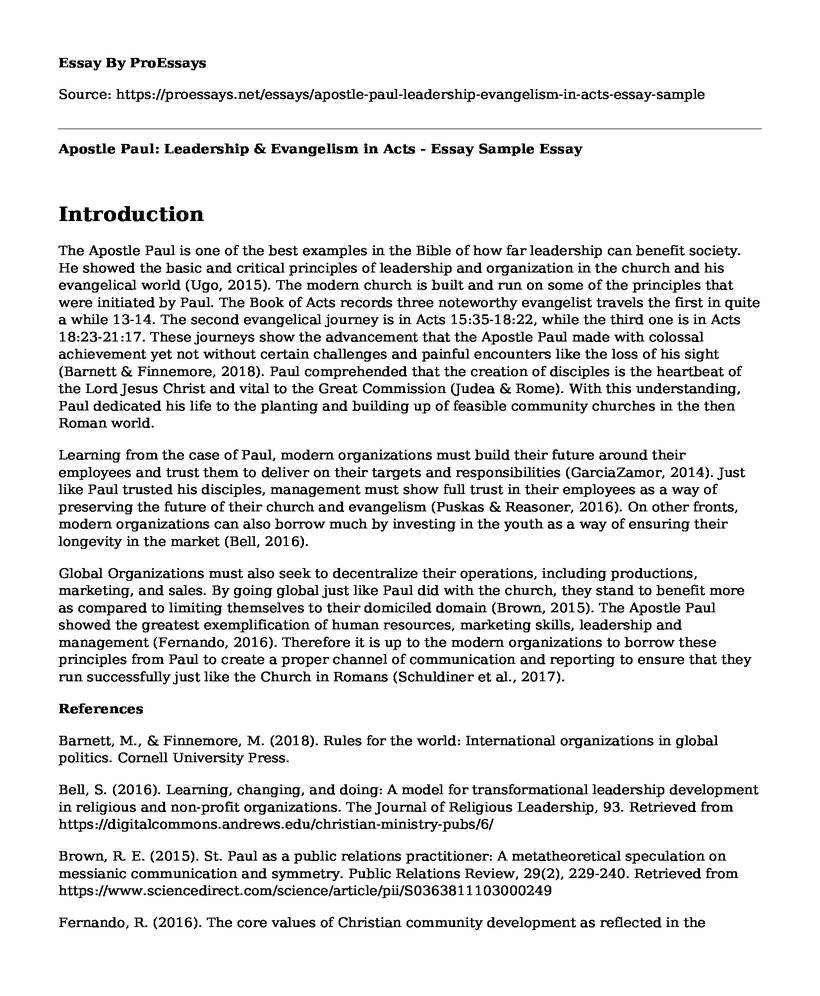Introduction
The Apostle Paul is one of the best examples in the Bible of how far leadership can benefit society. He showed the basic and critical principles of leadership and organization in the church and his evangelical world (Ugo, 2015). The modern church is built and run on some of the principles that were initiated by Paul. The Book of Acts records three noteworthy evangelist travels the first in quite a while 13-14. The second evangelical journey is in Acts 15:35-18:22, while the third one is in Acts 18:23-21:17. These journeys show the advancement that the Apostle Paul made with colossal achievement yet not without certain challenges and painful encounters like the loss of his sight (Barnett & Finnemore, 2018). Paul comprehended that the creation of disciples is the heartbeat of the Lord Jesus Christ and vital to the Great Commission (Judea & Rome). With this understanding, Paul dedicated his life to the planting and building up of feasible community churches in the then Roman world.
Learning from the case of Paul, modern organizations must build their future around their employees and trust them to deliver on their targets and responsibilities (GarciaZamor, 2014). Just like Paul trusted his disciples, management must show full trust in their employees as a way of preserving the future of their church and evangelism (Puskas & Reasoner, 2016). On other fronts, modern organizations can also borrow much by investing in the youth as a way of ensuring their longevity in the market (Bell, 2016).
Global Organizations must also seek to decentralize their operations, including productions, marketing, and sales. By going global just like Paul did with the church, they stand to benefit more as compared to limiting themselves to their domiciled domain (Brown, 2015). The Apostle Paul showed the greatest exemplification of human resources, marketing skills, leadership and management (Fernando, 2016). Therefore it is up to the modern organizations to borrow these principles from Paul to create a proper channel of communication and reporting to ensure that they run successfully just like the Church in Romans (Schuldiner et al., 2017).
References
Barnett, M., & Finnemore, M. (2018). Rules for the world: International organizations in global politics. Cornell University Press.
Bell, S. (2016). Learning, changing, and doing: A model for transformational leadership development in religious and non-profit organizations. The Journal of Religious Leadership, 93. Retrieved from https://digitalcommons.andrews.edu/christian-ministry-pubs/6/
Brown, R. E. (2015). St. Paul as a public relations practitioner: A metatheoretical speculation on messianic communication and symmetry. Public Relations Review, 29(2), 229-240. Retrieved from https://www.sciencedirect.com/science/article/pii/S0363811103000249
Fernando, R. (2016). The core values of Christian community development as reflected in the writings of the Apostle Paul. Social Work & Christianity, 33(4). Retrieved from http://search.ebscohost.com/login.aspx?direct=true&profile=ehost&scope=site&authtype=crawler&jrnl=07375778&AN=23580685&h=B7IJQuVEWivbDJ%2Fj6y9VJ32tnu%2FTe4rw2%2B7R%2Be2RRhts%2FKeM1Y%2FuiwKDtJxL97kkEUeL3aksapnTxFDAmdJOfg%3D%3D&crl=c
GarciaZamor, J. C. (2014). Workplace spirituality and organizational performance. Public administration review, 63(3), 355-363. Retrieved from https://onlinelibrary.wiley.com/doi/abs/10.1111/1540-6210.00295
Judea, J., & Rome, S. S. A. M. E. Study on ACTS Paul's 3 Missionary Journeys (ACTS 13: 1-21: 16).
Puskas, C. B., & Reasoner, M. (2016). The Letters of Paul: An Introduction. Liturgical Press.
Schuldiner, M., Collins, S. R., Thompson, N. J., Denic, V., Bhamidipati, A., Punna, T., ... & Weissman, J. S. (2017). Exploration of the function and organization of the yeast early secretory pathway through an epistatic mini array profile. Cell, 123(3), 507-519. Retrieved from https://www.sciencedirect.com/science/article/pii/S0092867405008688
Smircich, L., & Stubbart, C. (2016). Strategic management in an enacted world. Academy of Management Review, 10(4), 724-736. Retrieved from https://journals.aom.org/doi/abs/10.5465/amr.1985.4279096
Ugo, I. (2015). St. Paul's Church Planting Strategies as Revealed in Selected Passages in the Book of Acts. Global Missiology English, 3(9). Retrieved from http://daycenteronline.com/Files/PDF/ugoarticle.pdf
Cite this page
Apostle Paul: Leadership & Evangelism in Acts - Essay Sample. (2023, Apr 09). Retrieved from https://proessays.net/essays/apostle-paul-leadership-evangelism-in-acts-essay-sample
If you are the original author of this essay and no longer wish to have it published on the ProEssays website, please click below to request its removal:
- Box Station - Analysis of Vulnerabilities
- A Case Study of Engstrom Auto Mirror Plant
- The Christian Message of The Lion, the Witch, and the Wardrobe
- Essay Sample on Christian Reformers as Heroes
- Essay Sample on Leaders: Using 4 Frames to Solve Complex Situations
- Essay Example on Creating the Right Environment for a Successful Meeting
- Paper Example on Creating a Culture of Support, Respect, & Trust







